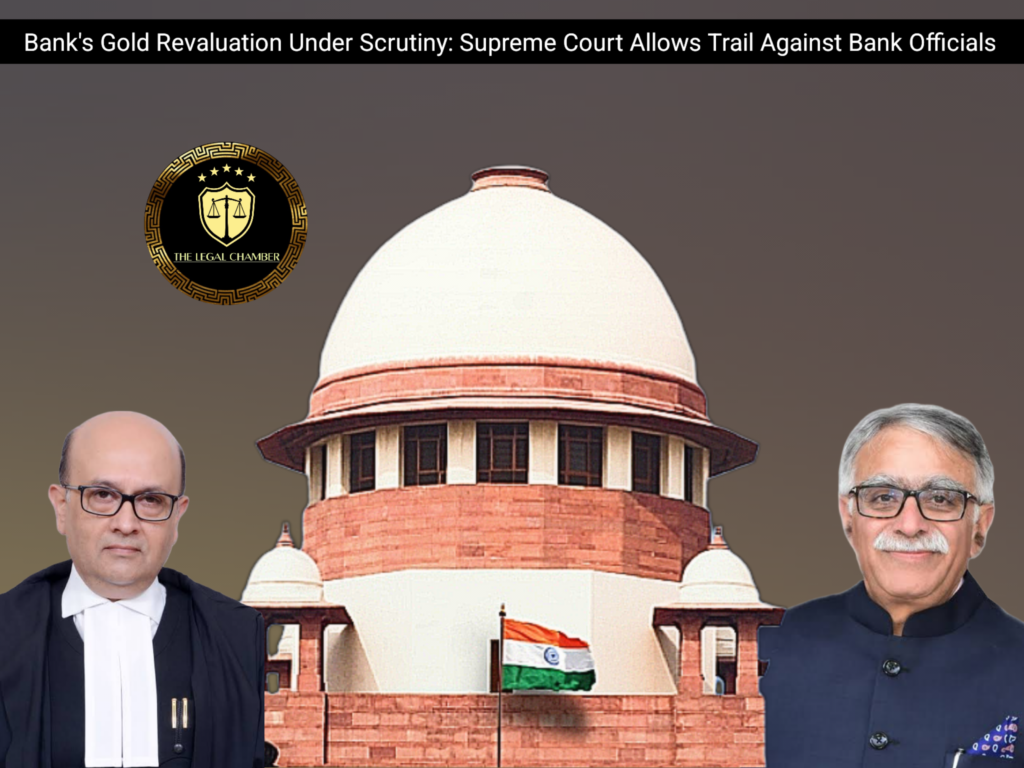
The Supreme Court of India allowed the appeal by Abhishek Singh, holding that the High Court improperly quashed the FIR filed by him. The High Court erred by considering extraneous documents and evaluating the merits of the case at the quashing stage, rather than determining if a prima facie offense was made out. The proceedings from the FIR are revived, and the guilt or innocence of the respondents is to be established at trial.
Facts Of The Case:
Abhishek Singh, the appellant, a businessman, secured a loan of ₹7,70,000 from the Bank of India on July 22, 2020, by pledging 254 grams of 22-carat gold ornaments. According to Singh, he repaid the loan, including interest, by March 31, 2023, after receiving a notice from the bank on October 7, 2022, to pay ₹8,01,383.59. However, unbeknownst to him, the bank revalued the pledged gold, deducting ₹1500 as fees. His requests for the return of the gold were ignored.Conversely, the bank contended that Singh did not repay the loan, leading to the gold becoming a bank asset. During revaluation by a different valuer, the pledged material was found to be gold-plated rather than actual gold. Consequently, an FIR was registered against Singh on May 22, 2023, under Sections 420 and 379 IPC. Subsequently, Singh filed an application under Section 156(3) of the Cr.P.C., leading to the registration of another FIR, which is the subject of this appeal. Respondent No. 1, the Branch and Credit Manager, was present during the revaluation of Singh’s gold. The investigating authorities filed a chargesheet on September 30, 2024. However, the respondents had already filed an application to quash Singh’s FIR on October 5, 2023, which the High Court allowed on November 12, 2024.
Procedural History:
The appellant, Abhishek Singh, filed an FIR on September 7, 2023, under Sections 420, 406, and 34 of the Indian Penal Code, 1860, being Mithanpura P.S. Case No. 393 of 2023. The investigating authorities completed their investigation and filed a chargesheet, Final Report/Chargesheet No. 371/24, dated September 30, 2024, before the Judicial Magistrate, 1st Class (East) Mithanpura. While the investigation was ongoing, the respondents filed an application seeking to quash the FIR on October 5, 2023. The High Court of Judicature at Patna allowed the respondents’ application under Section 482 of the Code of Criminal Procedure, 1973, in Criminal Miscellaneous No. 67884 of 2023, through a judgment and order dated November 12, 2024, thereby quashing the FIR. Aggrieved by this decision, Abhishek Singh, the complainant, approached the Supreme Court of India by way of Criminal Appeal No. of 2025, arising out of SLP (Crl.) No. 480/2025. The Supreme Court granted leave.
READ ALSO :Supreme Court Overturns Conviction Under Section 306 IPC: Limits on High Court’s Revisional Powers
The Supreme Court observed that the High Court, in quashing the FIR, had exceeded its jurisdiction by not only taking note of the bank’s fraud risk management policy and the removal of the first valuer, but also by concluding an absence of malafides on the part of the bank. The Court highlighted its confusion as to how the High Court arrived at the conclusion that the appellant undertook the loan process with “ill intention” or had an “ulterior motive,” stressing that determining intention requires evidence.The Supreme Court further noted the inconsistency in the High Court’s reasoning regarding the loan repayment and revaluation. Even though the appellant’s account was declared an NPA, the bank did not pursue the option to auction the gold, which was available to them. The Court pointed out that the revaluation report was dated February 2023, which was after the appellant had made the full payment and the loan was settled. Additionally, the appellant’s letters requesting the return of the pledged gold were sent after the final payment. The Court found it difficult to understand why the gold was revalued and auctioned once the loan was settled, despite the delay in repayment.Crucially, the Supreme Court observed that the High Court’s decision to quash the FIR did not address the possibility of the respondents’ involvement in the misappropriation of the pledged gold. The Court emphasized that without third-party verification, it could not be ruled out that individuals from the bank or valuers committed acts affecting the appellant’s gold. The Court reiterated that the appellant had no access to the gold after its initial valuation as it remained in the bank’s safe custody. Therefore, any fraud, whether at the initial valuation or later, could only be unearthed through a trial based on evidence. The Supreme Court concluded that, based on a perusal of the FIR, a prima facie case regarding the commission of an offense was indeed made out.
Final Decision & Judgement:
The Supreme Court held that the High Court had improperly quashed the criminal proceedings initiated by the appellant, Abhishek Singh. The Court clarified that it was not expressing any opinion on the merits of the matter, and the guilt or innocence of the respondents must be established during the trial in accordance with the law. Consequently, the proceedings arising from the subject FIR, as mentioned in paragraph 2 of the judgment, were revived and restored to the file of the concerned Court. The appeal was allowed. The Registry was directed to communicate a copy of this order to the Registrar General, High Court of Judicature at Patna, who would then forward it to the concerned Court for necessary action. Any pending applications were also closed.
Case Details:
Case Title: Abhishek Singh v. Ajay Kumar & Ors. Citation: 2025 INSC 807 Criminal/Civil Appeal No.: (Arising out of SLP(Crl.) No.480/2025) Date of Judgment: June 5, 2025 Judges/Justice Name: Sanjay Karol & Manoj Misra
Download The Judgement Here